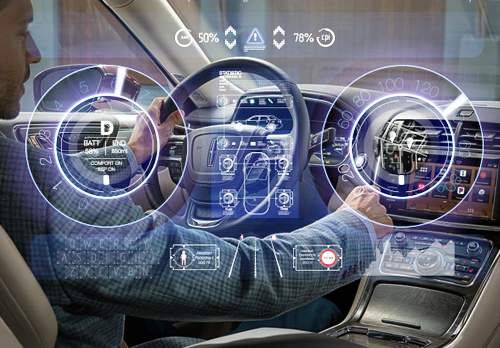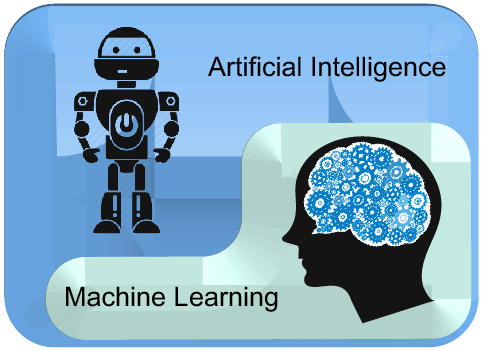Artificial intelligence or commonly known as AI is defined as the capability of a digital computer or a robot to perform tasks that are commonly associated with higher intellectual beings. Artificial intelligence is commonly applied in the projects of development of systems that are bestowed with the intellectual characteristic artificial intelligence of humans, such as the ability to generalize, discovering the meaning, reasoning or learning from past experiences.
First digital computer was developed in 1940 and since then it was demonstrated that a computer is capable of performing complex tasks such as solving the mathematical theorems or even complex, playing chess. With time these machines are able to learn from experience and perform tasks mimicking humans. In today’s world artificial intelligence has grown to be a very powerful tool. As artificial intelligence will continue to grow in future, it will have a huge impact on our lives.

Types of Artificial Intelligence
Basically four categories of AI are known to man, namely reactive machines, limited memory, theory of mind and self-awareness.

Reactive Machine AI
A reactive machine artificial intelligence includes machines that are designed to be operating only on the present data, and takes into account just the current situation at hand. Reactive machine artificial intelligence cannot form inferences with the present data and subsequently cannot evaluate their actions that will be performed in future. They are specifically designed to perform only narrow range of tasks. Some examples of the reactive machine artificial intelligence are world famous IBM chess program and the widely used search engine, Google.
Limited Memory AI
Limited Memory artificial intelligence can make improved and informed decisions by extracting the data from its memory. An artificial intelligence like limited memory has a temporary or short-lived memory that can be put into use to remember the experiences of the past and hence future actions can be evaluated. An example of limited memory artificial intelligence is self-driving cars. It uses the data which is collected in the past to perform immediate actions. For example, these types of cars use sensors to detect passengers that are crossing the roads and traffic signals to prevent any accidents in the future.
Theory of Mind AI
The theory of mind is a form of AI that has not yet been fully developed but researches are being carried out in this scientific area. It is considered to be highly advanced type of artificial intelligence. The machines included in this domain of artificial intelligence are speculated that they play an evident role in psychology. The main focus of this type of AI will be on emotional aspect of humans so that thoughts and believes of humans can be comprehended better.
Self-Aware AI
In case of self-aware artificial intelligence, it is hypothesized that in the future machines will have their own personal consciousness and will become self-aware. Given the present circumstances, this idea seems a little far-fetched. However, in the future it might be possible to achieve this stage of super intelligence.
Artificial Intelligence Machine Learning
Machine learning (MI) is considered a subset of artificial intelligence that allows different software applications to predict more accurate outcomes when they are not specifically designed to do so. In machine learning algorithms are used that rely on historical data as an input value and predict output.
A common use of machine learning is recommendation engines. Machine learning is thought to be important because it gives enterprises a clear strategy of handling customer behavior and business operations, as well as it also supports as other products are developed. In today’s era many leading companies, such as Facebook, Instagram and Google have made machine learning an integral unit of their operating systems.

Artificial Intelligence Reshaping the Automotive Industry
Artificial intelligence has significant application when it comes to the automotive value chain. Currently, the application of artificial intelligence in automotive sector includes designing, supply management, production, and post-production. In addition, artificial intelligence is also being supplemented in systems regarding assistance of driver and risk assessment of driver.
It is transforming the entire sector of transportation. Aftermarket services which consist of predictive maintenance and vehicles insurance are also transforming through using artificial intelligence. We are headed towards a future where all we have to do is tap out our destination in the smartphone and step into a vehicle and we will be driven there by a computer. From the time of hybrid to electric vehicles that promised the enjoyment of driver in accordance with balanced environmental protection to artificial intelligence, the automotive industry has been witnessing huge milestones that will leave it unrecognizable in few years’ time.
We have all seen how Tesla has upgraded the dynamics of the car industry. From its initial direct sales model to software programmed autonomous driving feature that makes driving to long-distances safer, less hectic and more money saving, Tesla is perhaps the best example known to mankind of how innovations in the car industry is shaping its future. Simultaneously robots are working with humans and learning skills of manufacturing such as automotive designing and assembly with the help of artificial intelligence. In the future these AI-powered robots will be capable of operating this entire plant.
The transportation sector has been entirely revolutionized with the use of AI. By the use of AI a vital role is being played in the driver assistance technology. Currently, only level 2 autonomous cars are being offered by Tesla, but level 4 and level 5 autonomous vehicles will be launched soon. Artificial intelligence will be used to monitor the driver’s eye that whether the driver is sleeping or tired.
Regarding the aftermarket services, by using artificial intelligence the problems regarding the performance of engine and battery can be predicted that may occur in future. For example it is possible to check if the bolting of the car body is in order at various points by means of data. A technician will receive feedback if a bolt connection is not in the right position and it can be readjusted directly.
This means that not only defects are detected during a final test, but they can also repair immediately, which will save both time and money. The welding work could be carried out even without a technician, welding and be automatically inspected. Sensor data provides information on welding sensors regarding the duration and intensity of the weld so that repairing can be done on the defective welding points.
Still within the automotive industry the use of artificial intelligence is going on a very slow pace. According to the data of 2015, only a minor percentage of 5-10% cars had some form of artificial intelligence delivered in them. In the last 5 years artificial intelligence has been put into use by deploying the system in assistance of parking, control of cruise and the development of level 1 and level 2 autonomic vehicles.
It is expected that in the next 8 to 10 years, artificial intelligence will be a part of many automotive applications. Hence, it can be said that by the end of 2030, almost 95-98% of all new vehicles will have artificial intelligence systems installed in them. With the increase use of artificial intelligence system in the vehicles, it is expected that this will increase the demand for autonomous cars in the next years. The data suggests that in 2019, the sale of autonomous cars accounted for 33 million and is said to reach 80 million units by 2030.
Currently, the hardware of the vehicle generates about 85–90% value of the car, and the remaining value is generated by the car’s software and content. In the following 8 to 10 years, 95 – 98% of the new car is expected to have some system of AI-powered technology installed in them. Because of this use of artificial intelligence, the value generated by technology will become 40–50% of the vehicle’s value. Nowadays, the vehicles that are manufactured are known by the name of engine maker, but in few years the vehicle is expected to be known by its software.
Artificial Intelligence Safety
While there is no doubt about how artificial intelligence has revolutionized our lives for better, still a bigger question remains that what if the quest for strong artificial intelligence succeeds and an artificial intelligence system is developed that is better than humans at all cognitive tasks and activities. Such a system would have the potential to undergo self-improvement which will lead to an intelligence explosion leaving human intellectual behaviors far behind.
A greater benefit of this super-intelligence would be by deploying it to eradicate disease, war and poverty. But if artificial intelligence is used for manufacturing of autonomous weapons, it could easily cause mass casualties. By illustrating these examples, the concern about the safety of artificial intelligence is raised. If a super-intelligent artificial intelligence system is developed over years, it will be very good at accomplishing its tasks and if those tasks are not in accordance with our tasks then there will be a problem.
